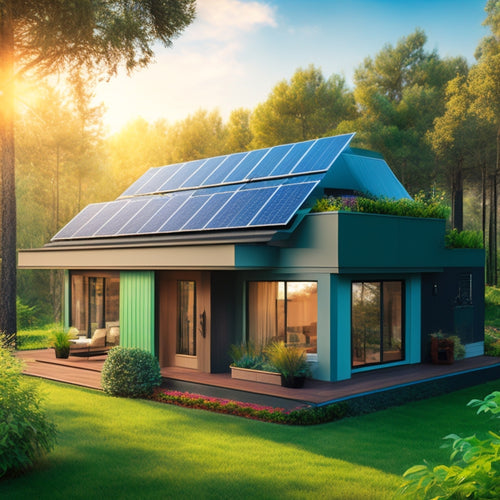
10 Best Irrigation Solutions for Electric Vehicle Owners
Share
As an electric vehicle owner, you're likely committed to reducing your carbon footprint. Now, you can extend your eco-friendly habits to your lawn care routine with the right irrigation solutions. Smart watering systems and controllers, integrating with EV charging stations, optimize irrigation schedules and reduce energy consumption. Low-flow irrigation systems, drip irrigation, and eco-friendly sprinkler heads conserve water and minimize waste. Weather-based irrigation scheduling, solar-powered pumps, and rain sensors further enhance efficiency. By adopting these solutions, you can maintain a healthy lawn while reducing your environmental impact. And there's more to investigate in the world of sustainable lawn care.
Key Takeaways
- Smart irrigation solutions integrate with EV charging stations to reduce overall energy consumption and environmental impact.
- WiFi-enabled irrigation controllers allow remote monitoring and adjustments, ensuring optimal watering schedules and minimizing waste.
- Drip irrigation and low-flow sprinkler systems conserve water, reducing environmental footprint and supporting sustainable landscaping practices.
- Weather-based irrigation scheduling and rain sensors prevent unnecessary watering, aligning with eco-friendly choices made by EV owners.
- Renewable energy integration, such as solar-powered irrigation pumps, further minimizes dependence on non-renewable energy sources.
Smart Watering Systems for EV Owners
With electric vehicles (EVs) becoming increasingly popular, it's essential for EV owners to optimize their energy consumption, and that includes smartly managing their water usage.
You can do this by investing in a smart watering system that employs smart soil sensors to monitor soil moisture levels. These sensors detect when your lawn needs watering, ensuring you don't waste water or energy.
As Renewable Energy Sources for EV Charging become more prevalent, it's vital to reflect on the environmental impact of our daily habits.
Think about integrating your smart watering system with your EV's charging station. This allows you to charge your vehicle while also powering your irrigation system, reducing your overall energy consumption.
Efficient Lawn Irrigation Methods
You'll want to contemplate smart sprinkler systems that adjust watering schedules based on weather forecasts, soil moisture levels, and lawn type to minimize waste.
Installing solar-powered charging stations solar-powered stations can also help reduce your electricity bills and carbon footprint.
Water-saving technologies, such as rain sensors and soil moisture sensors, can also be integrated into your irrigation system to optimize water usage.
Smart Sprinkler Systems
About 70% of homeowners in the United States irrigate their lawns, and smart sprinkler systems have emerged as a breakthrough in efficient lawn irrigation methods.
You can experience the benefits of automated irrigation with smart sprinkler systems, which integrate sensors to monitor soil moisture, temperature, and humidity. This guarantees that your lawn receives the right amount of water at the right time, minimizing waste and optimizing growth.
As EV owners focus on reducing their carbon footprint through solar-powered charging, they can also adopt eco-friendly practices in their daily lives, such as efficient irrigation methods.
With sensor integration, you can adjust your irrigation schedule based on real-time weather data, considering rainfall, evaporation rates, and more.
Water-Saving Technologies
By the time you've optimized your electric vehicle's charging process, you may be wondering how to extend your eco-friendly efforts to other areas of your life.
Efficient lawn irrigation methods can greatly reduce water waste and lower your environmental footprint. As you investigate renewable energy solutions, consider solar energy implementation to power your irrigation system.
Drip irrigation systems, which deliver water directly to the roots of plants, are a highly effective way to conserve water. Moisture sensors can also be integrated into your irrigation system to guarantee that your lawn only receives the amount of water it needs.
These water-saving technologies can help you achieve a lush, green lawn while minimizing your impact on the environment. By implementing these solutions, you'll not only save water but also reduce your energy consumption and enjoy greater freedom from utility bills.
Rain Bird Irrigation Controllers
You'll find Rain Bird irrigation controllers offer smart watering made easy, allowing you to automate your watering schedules with precision.
By optimizing your energy usage, you can reduce energy costs and make the most out of your irrigation system.
With wireless rain sensors, these controllers can detect rainfall and adjust your watering schedule accordingly, guaranteeing you're not wasting water.
Smart Watering Made Easy
As you step into the world of smart irrigation, Rain Bird irrigation controllers take center stage, simplifying the process of watering your lawn and garden with precision.
With automated moisture management, these controllers guarantee your plants receive the right amount of water at the right time, eliminating overwatering and underwatering.
Soil sensors integrated into the system provide real-time data, allowing the controller to adjust watering schedules accordingly. This means you can enjoy a lush, healthy lawn while minimizing water waste.
Plus, with Rain Bird's smart irrigation controllers, you can monitor and adjust your watering schedule remotely, giving you the freedom to manage your irrigation system from anywhere.
Wireless Rain Sensors
One of the most innovative features of Rain Bird irrigation controllers is their wireless rain sensors, which take the guesswork out of irrigation scheduling.
These sensors employ state-of-the-art sensor technology to accurately measure rainfall, ensuring your lawn receives the right amount of water. With real-time rainfall measurement, you'll never overwater or underwater again.
The wireless design allows for easy installation and eliminates the need for tedious wiring. As you enjoy the freedom of electric vehicle ownership, Rain Bird's wireless rain sensors give you the same freedom from irrigation worries.
With automatic adjustments based on rainfall, you'll conserve water and reduce your environmental footprint.
Timed Watering Schedules
With Rain Bird irrigation controllers, timed watering schedules can be customized to meet the specific needs of your lawn, considering factors such as soil type, climate, and vegetation.
You can create an automated scheduling system that guarantees your lawn receives the right amount of water at the right time. This means you can:
- Set specific watering times and frequencies based on your lawn's unique needs
- Make seasonal adjustments to account for changes in weather and growth patterns
- Override scheduled waterings in response to unexpected weather events, such as heavy rainfall
Green Lawn Care With Drip Irrigation
If you're looking to maintain a lush, lively lawn while also being mindful of your water usage, drip irrigation is an excellent solution. This method delivers water directly to the roots of your plants, reducing evaporation and runoff.
Drip irrigation boasts a high drip efficiency, typically above 90%, compared to traditional sprinkler systems which often waste up to 50% of water. By adopting drip irrigation, you're not only conserving this precious resource but also promoting sustainable landscaping practices.
This approach also encourages healthy plant growth, reduces weed populations, and lowers your water bill. As an electric vehicle owner, you're already making eco-friendly choices; drip irrigation is a natural extension of that commitment to environmental responsibility.
Weather-Based Irrigation Scheduling
You can take your eco-friendly lawn care to the next level by incorporating weather-based irrigation scheduling into your routine.
This advanced approach guarantees your lawn receives the right amount of water at the right time, minimizing waste and reducing your climate impact.
With weather-based scheduling, you can:
- Adjust irrigation schedules based on real-time weather data, including temperature, humidity, and precipitation
- Optimize soil moisture levels, reducing the risk of overwatering or underwatering
- Receive alerts and notifications when weather conditions change, allowing you to make informed irrigation decisions
Water Conservation With Sprinkler Systems
Sprinkler systems can be a significant water guzzler in your lawn care routine, but they don't have to be. You can take steps to conserve water and still keep your lawn healthy.
Consider incorporating rainwater harvesting into your irrigation system. This involves collecting and storing rainwater for later use, reducing your reliance on potable water.
Additionally, you can adopt xeriscaping techniques, which involve using drought-tolerant plants and efficient irrigation methods.
By implementing these strategies, you'll not only conserve water but also reduce your environmental impact.
Solar-Powered Irrigation Pumps
When you opt for solar-powered irrigation pumps, you'll need to contemplate the energy harvesting methods that best suit your irrigation needs.
You'll want to maximize energy output while minimizing costs, so it's crucial to evaluate the efficiency of different pump systems.
Energy Harvesting Methods
As electric vehicles continue to gain traction, their owners are increasingly seeking sustainable solutions to power their daily needs, including irrigation systems.
You're likely looking for ways to reduce your carbon footprint and reliance on non-renewable energy sources. Energy collection methods can be a transformative factor for irrigation systems.
Some of the most promising energy collection methods include:
- Solar energy: utilizing the power of the sun to generate electricity
- Wind power: using wind turbines to convert kinetic energy into electrical energy
- Piezoelectric systems: leveraging pressure and vibrations to generate electricity
Pump Efficiency Matters
Your search for an efficient irrigation system leads you to solar-powered pumps, which can greatly reduce your reliance on non-renewable energy sources.
As you investigate pump technology, you'll find that energy efficiency is a critical factor. Solar-powered pumps boast high efficiency rates, often above 80%, compared to traditional pumps that typically range from 40% to 60%.
This means you'll save energy and reduce your carbon footprint. Look for pumps with high-efficiency motors and optimized impeller designs to maximize water flow while minimizing energy consumption.
WiFi Enabled Irrigation Controllers
Frequently, electric vehicle owners seeking to optimize their irrigation systems turn to WiFi enabled irrigation controllers, which offer unparalleled convenience and flexibility.
With these controllers, you can easily monitor and adjust your irrigation system from the comfort of your own home or on-the-go using your smartphone or tablet. This means you'll never have to worry about overwatering or underwatering your lawn again.
Some of the key benefits of WiFi enabled irrigation controllers include:
-
Smart home integration: Seamlessly integrate your irrigation system with other smart devices in your home for a truly automated experience.
-
Remote monitoring: Receive real-time updates on your irrigation system's performance and receive alerts if any issues arise.
-
Customizable scheduling: Create personalized irrigation schedules based on your specific lawn type, climate, and water restrictions.
Low-Flow Irrigation System Options
Optimizing your irrigation system for electric vehicle owners doesn't stop at WiFi enabled controllers. You can take it to the next level with low-flow irrigation system options that conserve water and reduce your environmental footprint. One effective approach is to adopt drip irrigation, which delivers water directly to the roots of plants, minimizing evaporation and runoff.
| Low-Flow Irrigation Option | Benefits |
|---|---|
| Drip Irrigation | Reduces water waste and evaporation |
| Moisture Sensors | Automatically adjusts watering schedules based on soil moisture levels |
| Rain Sensors | Skips watering sessions during rainfall |
| Pressure-Regulating Valves | Guarantees consistent water pressure throughout the system |
Eco-Friendly Sprinkler Head Solutions
Eco-friendly sprinkler head solutions are an essential component of an environmentally responsible irrigation system, and electric vehicle owners can reap significant benefits from incorporating them into their landscaping.
By choosing sprinkler heads made from sustainable materials, you'll reduce your environmental footprint and contribute to a more eco-conscious lifestyle.
Here are some key features to look for:
- Low-flow rates: Reduce water waste and conserve this precious resource.
- Durable construction: Sprinkler heads built to last, minimizing replacement needs and waste.
- Adjustable spray patterns: Customize your watering schedule to optimize efficiency and minimize evaporation.
Frequently Asked Questions
Can I Install Irrigation Systems Myself or Need Professional Help?
Taking the reins on DIY irrigation might be tempting, but honestly, it's not for the faint of heart. Unless you're handy with pipes and wiring, you'll likely need professional installation to avoid costly mistakes and guarantee a seamless, stress-free setup.
Are Smart Irrigation Controllers Compatible With All EV Charging Stations?
You'll find that smart irrigation controllers are generally compatible with most EV charging stations, but it's essential to check the specific controller's charging compatibility to guarantee seamless integration and avoid any potential electrical interference or safety issues.
How Do I Choose the Right Irrigation System for My Yard Size?
When selecting an irrigation system, you'll want to evaluate your yard size and specific needs. Measure your lawn's square footage and determine the number of zones needed. Research different irrigation system types, such as drip, sprinkler, or smart systems, to find the best fit for your unique yard size evaluations.
Will a Rain Sensor Automatically Turn off My Irrigation System?
You'll be happy to know that a rain sensor will automatically turn off your irrigation system when it detects sufficient rainfall, optimizing irrigation system efficiency and conserving water, while also providing other rain sensor benefits like reduced runoff and erosion.
Can I Use a Single Irrigation Controller for Multiple Zones?
"Many hands make light work" - and so do multiple zones with a single irrigation controller! You can manage multiple zones with one controller, ensuring efficient zone management, as long as the controller is compatible with your specific zone requirements.
Related Posts
-

What Do Power Strips Do for Standby Energy?
You're likely aware that your devices, such as TVs and computers, continue to draw power even when turned off, a phen...
-

3 Green HVAC Filters for Solar-Powered Homes
When outfitting your solar-powered home with an HVAC system, you'll want to choose filters that align with your commi...
-

10 Eco-Friendly Air Management Tools for Clean Home Living
You're taking an essential step towards creating a healthier living space by seeking eco-friendly air management tool...


